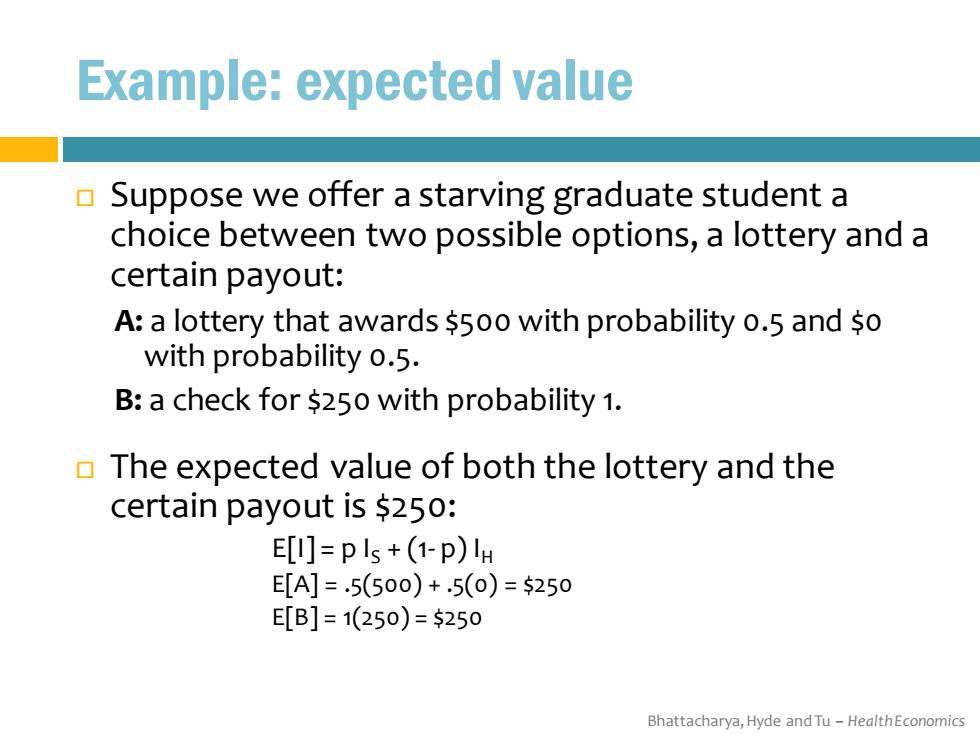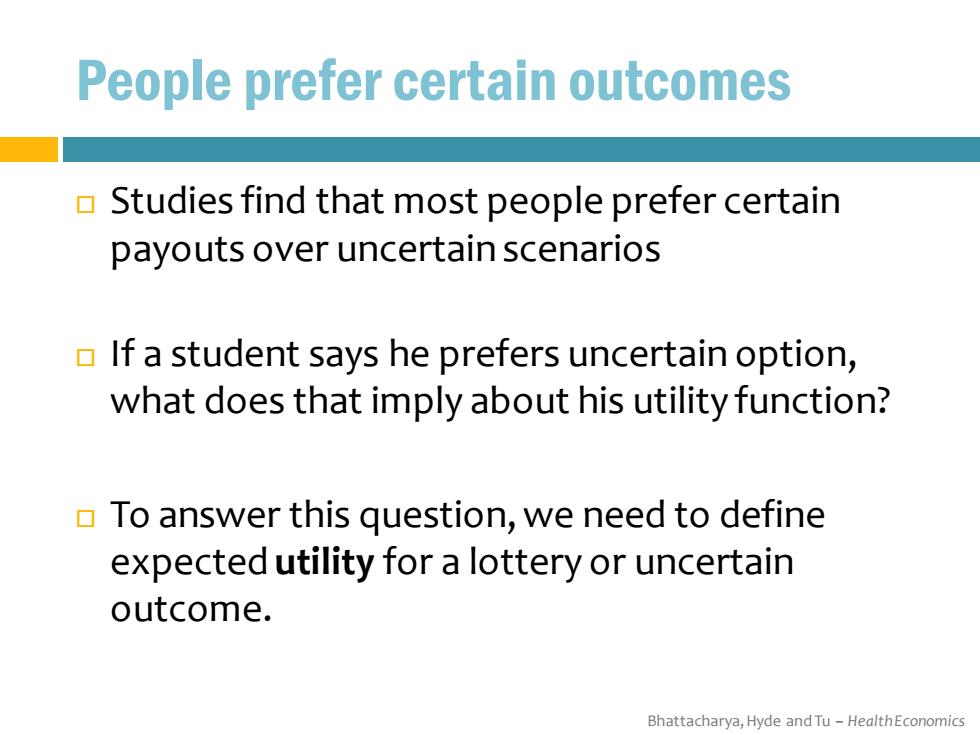
Expected value The expected value of a random variable X,E[X],is the sum of all the possible outcomes of X weighted by each outcome's probability If the outcomes are x,x2,...,n,and the probabilities for each outcome are p1,p2,...,Pn respectively,then: E[X]=PX+p2X2+..+Pn Xn In our individual's case,the formula for expected value of income E[l]: [叮=pls+(1p)lH Bhattacharya,Hyde and Tu-HealthEconomics
Bhattacharya, Hyde and Tu – Health Economics Expected value The expected value of a random variable X, E[X], is the sum of all the possible outcomes of X weighted by each outcome’s probability If the outcomes are x1 , x2 , . . . , xn , and the probabilities for each outcome are p1, p2 , . . . , pn respectively, then: E[X] = p1 x1 + p2 x2 + · · · + pn xn In our individual’s case, the formula for expected value of income E[I]: E[I] = p IS + (1- p) IH

Example:expected value Suppose we offer a starving graduate student a choice between two possible options,a lottery and a certain payout: A:a lottery that awards $500 with probability o.5 and so with probability o.5. B:a check for $250 with probability 1. The expected value of both the lottery and the certain payout is $250: E[I]=pIs+(1-p)I E[A]=.5(500)+.5(o)=$250 E[B]=1(250)=250 Bhattacharya,Hyde and Tu-HealthEconomics
Bhattacharya, Hyde and Tu – Health Economics Example: expected value Suppose we offer a starving graduate student a choice between two possible options, a lottery and a certain payout: A: a lottery that awards $500 with probability 0.5 and $0 with probability 0.5. B: a check for $250 with probability 1. The expected value of both the lottery and the certain payout is $250: E[I] = p IS + (1- p) IH E[A] = .5(500) + .5(0) = $250 E[B] = 1(250) = $250

People prefer certain outcomes Studies find that most people prefer certain payouts over uncertain scenarios If a student says he prefers uncertain option, what does that imply about his utility function? To answer this question,we need to define expected utility for a lottery or uncertain outcome. Bhattacharya,Hyde and Tu-HealthEconomics
Bhattacharya, Hyde and Tu – Health Economics People prefer certain outcomes Studies find that most people prefer certain payouts over uncertain scenarios If a student says he prefers uncertain option, what does that imply about his utility function? To answer this question, we need to define expected utility for a lottery or uncertain outcome

Expected Utility The expected utility from a random payout X E[U(X)]is the sum of the utility from each of the possible outcomes,weighted by each outcome's probability. If the outcomes are x,X2,...,Xn,and the probabilities for each outcome are p,,P2,...,Pn respectively,then: ▣E[U(X)]=PU(x)+P2U(x2)+·+PnU(xn) Bhattacharya,Hyde and Tu-HealthEconomics
Bhattacharya, Hyde and Tu – Health Economics Expected Utility The expected utility from a random payout X E[U(X)]is the sum of the utility from each of the possible outcomes, weighted by each outcome’s probability. If the outcomes are x1 , x2 , . . . , xn , and the probabilities for each outcome are p1 , p2 , . . . , pn respectively, then: E[U(X)] = p1 U(x1 ) + p2 U(x2 ) + · · · + pn U(xn )

Example The student's preference for option B over option A implies that his expected utility from B,is greater than his expected utility from A: E[U(B)]≥E[U(A)] U(525o)20.5U(500)+0.5U(50) In this case,even though the expected values of both options are equal,the student prefers the certain payout over the less certain one. This student is acting in a risk-averse manner over the choices available. Bhattacharya,Hyde and Tu-HealthEconomics
Bhattacharya, Hyde and Tu – Health Economics Example The student’s preference for option B over option A implies that his expected utility from B, is greater than his expected utility from A: E[U(B)] ≥ E[U(A)] U($250) ≥ 0.5 U($500) + 0.5 U($0) In this case, even though the expected values of both options are equal, the student prefers the certain payout over the less certain one. This student is acting in a risk-averse manner over the choices available